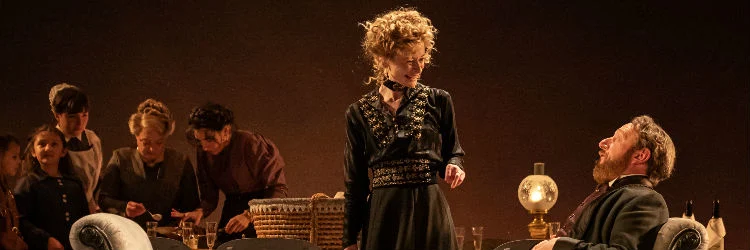Review - Tom Stoppard's Leopoldstadt at the Wyndham's Theatre
The last new Tom Stoppard play to open directly in the West End was Indian Ink - itself based on an earlier radio play - which premiered at the Aldwych Theatre twenty-five years ago. All of his plays since then have mostly been seen first at the National, including the three-part The Coast of Utopia, Arcadia and The Invention of Love (the latter pair of which then transferred to the West End), with one other play Rock 'n' Roll originating at the Royal Court in 2005 (though its West End transfer was already announced before it even opened there).
So the first striking thing about Leopoldstadt is that it has dared to open, under the auspices of London's most prolific producer Sonia Friedman, directly into the West End, where it is booking through mid-June (and can't be extended as Life of Pi is already booked in to follow it, transferring from Sheffield, later that month). It is the sixth collaboration between Friedman and Stoppard, including the West End and Broadway transfers of the Menier's revival of Travesties.
The second thing is its sheer scale and scope: it's nothing less than an epic portrait of a Jewish family's lives across multiple generations of the first half of the last troubled century, beginning in 1899 and ending in 1955, performed by a company of some 41 actors (26 adults, 15 children).
But even more significant than either of these factors is that it marks both a probable end-point in its playwright's career, but also a uniquely personal one that brings out new reservoirs of sadness in a writer whose work is usually populated by more intellectual thought and verbal gymnastics than actual feeling. In a Radio 4 interview ahead of the opening, the 82-year-old writer stated it would likely to be his last play: "I am slowing up. This one took longer to write. And the other thing is, what on earth can you write about after that? When I finished Leopoldstadt I thought, 'I can't go through all that again.' Four years tend to go by between my plays, so I will be 86 or 87 before I write another, and I wondered whether people who are 87 do have plays on."
In an extended programme note, adapted from a 1999 piece that was published in talk magazine, Stoppard discusses finding out about his own Jewish heritage, after he was born to a secular family in Czechoslovakia in 1937, but which he didn't really find out the facts of until the mid-90s.
As someone who only discovered my own Jewish heritage (on my mother's side) less than 20 years ago, when I was already well into my 30s, Stoppard and I have something in common; and his play even identifies a label that would have applied to my matriarchal grandmother: "There were a few thousand who never left, living below the surface with a gentile husband or wife. U-boats, they were called", explains one character to another. The only difference between the characters in this play and my mother's background is that my mother was born and raised in Nazi-occupied Lodz in Poland, not Vienna in Austria where the play is set.
So the play struck a raw cord of emotion in me. But I defy anyone not to be intensely moved by the play as it moves to its conclusion, and the painful and enduring legacy of the Holocaust (which I won't spoil by revealing how it is shown here).
It would also be fair to say that, until then, the play is a bit of a slow-burn, heavy on exposition as it introduces its canvas of characters, and their backgrounds and relationships to each other. Some of this is quite hard going - there is, naturally, a typically Stoppardian diversion into the dubious joys of explaining mathematical theory - but there's also a generous helping of Jewish history and traditions to embrace, too, like the symbolic power of a Passover seder.
It's when the play personalises this that it is at its most potent and effective. It is played and staged with a glowing warmth throughout, with lovely and loving ensemble character work on display across the board, with particularly moving work from Sebastian Armesto and Luke Thallon, Adrian Scarborough and (amplifying the personal connection) Ed Stoppard, the playwright's own actor son, in a leading role.
This is a powerful, important new play from one of our greatest living playwrights that, should it prove to be his swansong, means he has gone out on a significant high, even as he dramatises a low point on world history.
Leopoldstadt is at the Wyndham's Theatre until 13th June.
Leopoldstadt tickets are available now.
Originally published on
